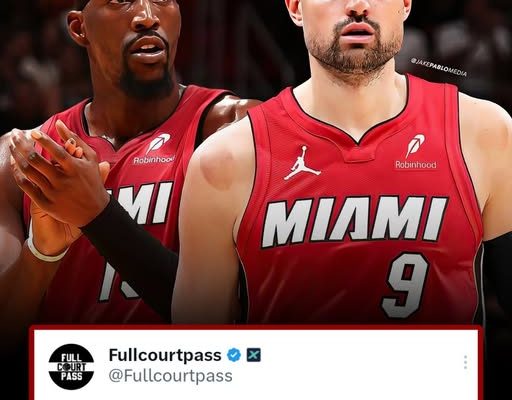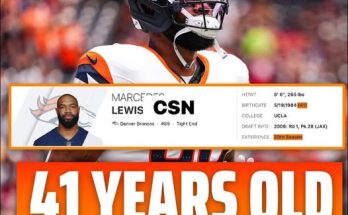Nikola Vucevic’s future with the Chicago Bulls appears to be taking a dramatic turn as recent reports suggest that the trade market for the veteran center has virtually disappeared, leaving a midseason buyout as a more probable outcome than a traditional trade. According to Jake Fischer of Yahoo Sports, the Bulls are facing a significant challenge in finding a team willing to take on Vucevic’s contract, given the current dynamics of the league, his recent performance, and the shifting priorities of potential contenders. This development has sparked discussions around the league about Vucevic’s value, the Bulls’ roster strategy, and how his career trajectory could change if he becomes a free agent during the season.
Vucevic, a two-time NBA All-Star, was acquired by Chicago from the Orlando Magic in March 2021 in a move that signaled the Bulls’ intent to accelerate their rebuild and compete in the Eastern Conference. At the time, Vucevic was seen as an elite scoring big man with the ability to stretch the floor, rebound at a high level, and serve as a complementary piece alongside stars like Zach LaVine and DeMar DeRozan. The Bulls gave up significant assets to acquire him, including Wendell Carter Jr. and multiple first-round draft picks, underscoring their belief in Vucevic’s ability to help transform the team into a contender. However, the anticipated leap never quite materialized. While the Bulls did manage to make the playoffs during the 2021-2022 season, injuries and roster inconsistencies have kept them from becoming a legitimate threat in the East.
Now, at 33 years old, Vucevic is no longer viewed as a cornerstone player but rather as a skilled veteran whose market appeal is limited by his defensive liabilities and hefty contract. He is currently in the second year of a three-year, $60 million extension he signed with Chicago in 2023, and that contract appears to be a major obstacle for teams that might otherwise consider adding him. Many front offices are hesitant to commit that level of salary to a player who, while still productive offensively, does not significantly elevate a team’s defense or overall ceiling. This combination of factors has left the Bulls with very few trade options, according to Fischer’s report.
The concept of a buyout becomes more intriguing when considering how the market for veteran big men has shifted in recent years. Teams are increasingly prioritizing younger, more versatile players who can guard multiple positions and contribute in up-tempo systems. While Vucevic offers reliable scoring and rebounding, he is not the type of athletic rim protector or switchable defender that modern contenders often seek. Additionally, the current NBA landscape is filled with teams that are either firmly in contention with established rosters or in the midst of rebuilding, leaving little middle ground for a player like Vucevic who thrives as a secondary or tertiary scoring option but does not necessarily fit into a long-term developmental plan.
If Vucevic and the Bulls were to agree to a buyout, he would suddenly become one of the most sought-after free agents on the market, particularly for playoff-bound teams in need of a proven offensive weapon off the bench or a backup big man with experience. Contenders like the Boston Celtics, Miami Heat, Golden State Warriors, or even the Los Angeles Lakers could potentially show interest, depending on how their rosters evolve throughout the season. In such a scenario, Vucevic could sign with a team for a veteran minimum deal or a portion of the mid-level exception, giving him a chance to compete for a championship while still earning the bulk of his salary from the buyout agreement with Chicago.
For the Bulls, moving on from Vucevic would represent a significant pivot in their organizational strategy. It would likely signal the start of a more focused rebuild around younger players like Patrick Williams, Coby White, and Ayo Dosunmu, while also providing more flexibility to explore trades for DeRozan or even LaVine. Chicago’s current roster construction has been criticized for its lack of spacing and defensive issues, and parting ways with Vucevic could be the first step in retooling the team’s identity. While a buyout means the Bulls would not receive any direct assets in return, it would free up playing time for younger frontcourt players and potentially create cap flexibility in future seasons.
Vucevic’s declining trade value is not solely a reflection of his skillset but also of timing and market conditions. The Bulls have not been particularly competitive this season, and with the Eastern Conference loaded with teams like the Milwaukee Bucks, Boston Celtics, and Philadelphia 76ers, it is difficult to see Chicago making a deep playoff run even if they kept their current core intact. As such, teams around the league may view Vucevic as an expendable piece rather than a game-changing addition. This perception has driven down his trade market and left the Bulls with little leverage in negotiations.
Another factor complicating a trade is the financial landscape of the NBA under the new collective bargaining agreement. With the introduction of the second apron, teams are becoming more cautious about taking on large contracts that could push them into luxury tax territory. Vucevic’s $20 million annual salary is not insignificant, and teams would have to match salaries in any trade, further limiting the pool of potential suitors. Even teams that could use a skilled center may prefer to wait and see if he becomes available via buyout rather than giving up valuable assets to acquire him midseason.
From Vucevic’s perspective, a buyout might not be the worst outcome. While it is never ideal for a player to be bought out of his contract, it could give him a fresh start and a chance to play meaningful basketball on a team with championship aspirations. His offensive skillset, including his ability to shoot from beyond the arc, operate in the post, and facilitate from the high post, remains valuable in the right context. On a team with strong perimeter defense and a more dynamic frontcourt partner, Vucevic could thrive in a reduced role that focuses on his strengths without exposing his defensive limitations as much.
The situation also raises broader questions about the Bulls’ direction and front-office decision-making. When Chicago traded for Vucevic, it was seen as a bold move to accelerate their rebuild. However, the lack of long-term success from that trade highlights the challenges of building a contender without a clear superstar or cohesive plan. With DeRozan entering the latter stages of his career and LaVine’s future uncertain due to ongoing trade rumors, the Bulls might find themselves at a crossroads. Moving on from Vucevic could be the first domino to fall in a series of significant roster changes aimed at reshaping the franchise for the future.
While Fischer’s report suggests that a buyout is more likely than a trade, the Bulls still have time to explore other options before making a final decision. The NBA trade deadline often brings unexpected opportunities as teams reassess their needs and strategies. A contender dealing with injuries or struggling with frontcourt depth might still come calling if Vucevic’s price tag becomes more reasonable. However, as things currently stand, it appears that Chicago’s best path forward may involve parting ways with their veteran center in a manner that benefits both sides.
In the meantime, Vucevic remains a professional presence on the court, continuing to contribute offensively and on the glass. His averages this season reflect a player who can still score efficiently and rebound at a high level, but the question is no longer about his individual production—it’s about fit and long-term strategy. The Bulls have to decide whether clinging to the status quo is worth delaying a potential rebuild or whether embracing change now could set the stage for a brighter future.
The coming weeks will be critical in determining the fate of Nikola Vucevic in Chicago. If a trade cannot be found, both sides will likely begin negotiating the terms of a buyout that would allow him to join a contender and give the Bulls a chance to retool. Such a move would mark the end of an era that began with high hopes but has since fizzled, and it would serve as a reminder of how quickly circumstances can change in the NBA. For Vucevic, the next chapter could offer redemption and the opportunity to chase a championship, while for the Bulls, it could be the start of a necessary reset.



